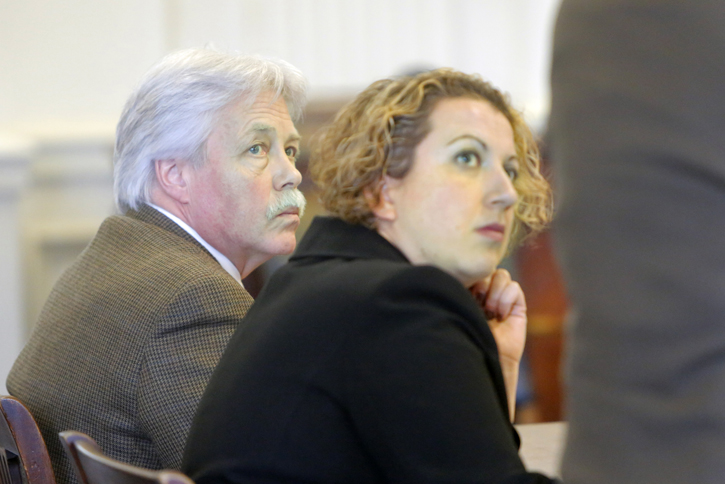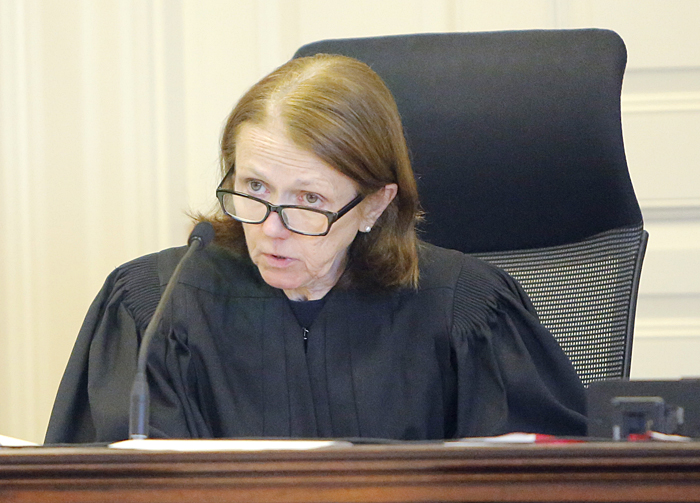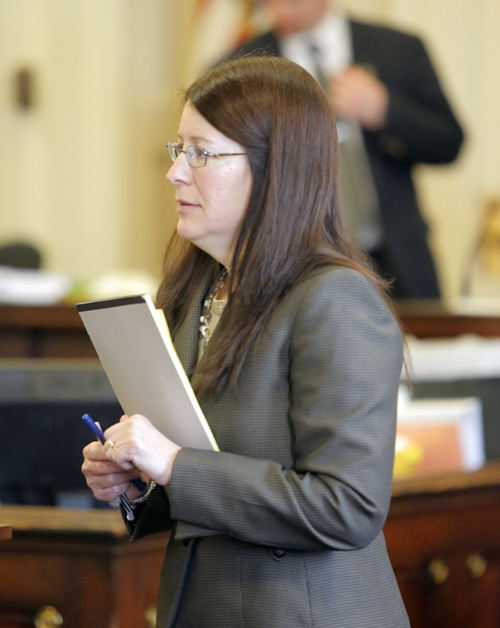PORTLAND – The highly anticipated trial of Mark Strong Sr., one of two key defendants in the Kennebunk prostitution case, has been halted until Feb. 13, when the Maine Supreme Judicial Court will take up an appeal by the prosecution.
Prosecutors are seeking to have 46 of the original 59 counts against Strong reinstated.
Justice Nancy Mills dismissed the 46 counts related to violation of privacy last week. The prosecutors appealed to the high court and asked for the trial to be stopped until a ruling is issued.
Supreme Court Chief Justice Leigh Saufley submitted a scheduling order shortly after 4 p.m. Tuesday, setting dates to submit legal briefs leading up to oral arguments Feb. 13 in Portland.
Strong, 57, of Thomaston, is accused of conspiring with Alexis Wright to run a one-woman prostitution business from her Zumba studio in Kennebunk, and of helping to make video recordings of her encounters with customers.
The trial, which would be the first major courtroom showdown since the scandal broke last year, has been on hold since Friday.
Thirteen charges are still pending against Strong: 12 counts of promotion of prostitution and a single count of conspiracy to promote prostitution.
Earlier Tuesday, a hearing in York County Superior Court ended in confusion when Mills said she would dismiss the pool of potential jurors, then said they would remain on standby.
She said she had learned that York County retains jury pools for two months, unlike Cumberland County, where jury pools are retained for one month.
The pool of potential jurors is down to 67 people from the initial 250.
Mills rejected a motion by Strong’s attorney, Daniel Lilley, to go ahead with the trial on the remaining 13 counts and deal with the 46 counts later, pending the prosecutors’ appeal.
She did agree with Lilley last week in his argument that people who engage in a criminal act cannot have an expectation of privacy.
In dismissing the violation-of-privacy charges, she ruled that patrons who were committing a crime by paying for sex “may have had a subjective expectation of privacy, but I can’t find an objective expectation of privacy that society would be willing to expect.”
York County Deputy District Attorney Justina McGettigan, appealed that ruling, arguing that it poses a “serious impairment” to the prosecution of the case.
McGettigan argued Tuesday that the 13 pending counts of promotion of prostitution and the 46 dismissed counts of violation of privacy are “all an interconnected scheme.”
Mills sided with McGettigan in saying that a trial on the 13 counts would be unfair to the prosecution, with the possibility that the Supreme Court could reinstate the other 46.
She then declared she would dismiss the jury pool and “start over” after the Supreme Court rules on the appeal.
She reconvened the court minutes later, after realizing she had made a mistake.
“(The jurors) will not be dismissed or discharged,” Mills said.
She said she was concerned about the length of the jury selection process, which started a week ago, and statements Lilley has made to the media in violation of a court-imposed gag order, because they may have been read by potential jurors and “influenced their impression of the case.”
Lawyers in the case were barred from discussing what happened in court. Mills renewed her gag order with vigor Tuesday morning, scolding Lilley for speaking to the press last week and over the weekend.
McGettigan filed a complaint with the judge, citing two newspapers and three television stations that quoted Lilley outside the courthouse in Alfred on Friday.
She further cited the Portland Press Herald for quoting from subsequent phone interviews with Lilley.
“The court made it crystal clear in chambers and elsewhere that we were not to speak to the press,” McGettigan said.
The prosecutor cited quotes by Lilley, in which he said “the state needs to get off its ass and try this case” and needs to decide whether to “fish or cut bait.”
“Mr. Lilley is a skilled orator,” McGettigan said. “He knew very well what he was doing. He’s a very experienced lawyer.”
Lilley said his public comments were about procedural aspects, not the substance of the case, but the judge disagreed. “Any further violation of the order will be dealt with by me,” Mills said.
Prosecutors and defense attorneys have until Feb. 4 to file briefs in the appeal.
Strong’s attorneys have until Feb. 7 to file a rebuttal. And prosecutors have until Feb. 11 to file their rebuttal.
Also Tuesday, Mills ordered McGettigan to add numbered labels to the large catalogues of evidence that the prosecution plans to present in the trial, including thousands of pages of emails between Strong and Wright.
The state also plans to present their cellphone exchanges and nearly 14,000 screen shots of online video conversations between them.
Authorities have said that Strong and Wright communicated in video calls before and after Wright’s videotaped encounters with customers.
McGettigan said those videos, despite their sexually explicit nature, will be shown in court as evidence of Strong’s and Wright’s crimes.
Staff Writer Scott Dolan can be contacted at 791-6304 or at:
sdolan@pressherald.com
Send questions/comments to the editors.






Comments are no longer available on this story